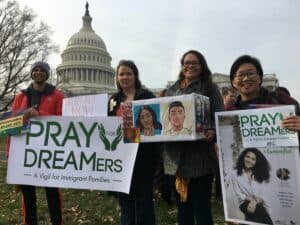
On November 9, 2016, I rode the regional rail to my grad school class. People cried on the train, on the street, in class. Instead of the usual lecture and discussion on social policy, our professor presided over a group therapy session where we were all stupefied at the prospect of a Trump presidency. I remember sharing that as an immigrant from Malaysia, my shock and horror stemmed from the fact that I grew up in a country where American democracy was often held up as an example of what ideals of freedom and equality looked like. Someone replied, as though informing a child Santa wasn’t real, that for minorities American democracy has always been unfree and unequal.
Well, yes.
But like most other immigrants, the myth of the American Dream, the idea that everyone has a shot at making something of themselves regardless of the circumstances of their birth, has a powerful hold on me. And I’m happy to return the embrace. Immigrants believe this myth almost theologically (problematic though it may be) and at rates higher than the native-born. This is probably why we’re twice as likely to start a new business as native-born Americans. Rates of entrepreneurialism are declining among natives, but rising among immigrants.
This belief goes beyond the pollyannaish. It’s also a potent weapon in the struggle for a better life. As evidence mounts that the American dream is fading, it is nevertheless true that this has fueled social change in America. The dream is not reality. The dream is aspirational. It is through highlighting the difference between the aspirational and the reality that Americans have been able to fight for a more perfect union.
I cannot think of a similar dream in the country of my birth. The Malaysian government has been run by an explicitly race-based coalition since independence in 1957, and our top politicians every so often spew tribal rhetoric with impunity because that is normal. In a country where facets of tribalism like race and religion are largely viewed as an immutable—even necessary—part of life, on what common ground can Malaysians demand freedom and equality?
The normalization of tribal politics in the Trump era is chilling because American leaders used to take it for granted that they had to pay tribute to the egalitarian aspirations of the American Dream, even if such tributes were nothing more than lip service. As the white supremacists in Charlottesville didn’t bother with white hoods, the Trump administration doesn’t bother with any sort of facade. Look at Eminem and Jay-Z, at Texas and Puerto Rico. The racism is so clear there’s no room for curiosity: Ta-Nehisi Coates confessed at this year’s keynote talk at SXSW, “This is horrible for a journalist to say, but I don’t feel like I have questions for Trump.”
The normalization of tribal politics in the Trump era is chilling because American leaders used to take it for granted that they had to pay tribute to the egalitarian aspirations of the American Dream, even if such tributes were nothing more than lip service.
I received with mixed feelings my permanent resident card in the mail last March, shortly after United States Citizenship and Immigration Services erased language that describes the U.S. as a “nation of immigrants.” Here’s USCIS’s previous mission statement:
“USCIS secures America’s promise as a nation of immigrants by providing accurate and useful information to our customers, granting immigration and citizenship benefits, promoting an awareness and understanding of citizenship, and ensuring the integrity of our immigration system.”
Here’s the new mission statement as currently appears on the agency’s website:
“U.S. Citizenship and Immigration Services administers the nation’s lawful immigration system, safeguarding its integrity and promise by efficiently and fairly adjudicating requests for immigration benefits while protecting Americans, securing the homeland, and honoring our values.”
It’s difficult to view this as nothing more than a cosmetic change. Like Ben Carson removing anti-discrimination language from the HUD mission statement, this wordplay evidences—and portends—substantial policy shifts. The USCIS mission statement functions as a sort of counterpart to the New Colossus. While most immigrants may no longer find themselves welcomed by the Statue of Liberty as their boat pulls into Ellis Island, twenty-first century immigration policy funnels the huddled masses through an unassuming .gov website. Two years ago the question was, “Do we want illegal immigrants?” Now the question is, “Do we want any immigrants?” It appears there is reason to hold at once two conflicting ideas:
- The Trump administration signals a break from American norms.
- The Trump administration signals continuity with American norms.
In many ways, the Trump administration represents a break from nearly every norm imaginable, ranging from its historic staff turnover to its firehose of lies to its coddling of white supremacists. Beyond tweets and headlines, real changes are underway as the Trump administration remakes the regulatory state:
- The citizenship question on the census will adversely affect immigrants and diverse (and liberal) states.
- The Department of Homeland Security is expanding the definition of who constitutes a “public charge” in a 223-page rule change proposal which seeks to deny legal residence to immigrants who receive almost any form of welfare or public benefit.
- The State Department will require almost all visa applicants to the U.S. to submit social media information in an effort to spot terrorist activity, but offered no clear direction as to how the data collected will be scrutinized.
The sum of the Trump administration’s parts has consequences. In a 2016 report the American Psychological Association found that discrimination-based stress is real and correlated with negative health outcomes for all minority groups. With “racism sanctioned by the highest office,” the Southern Poverty Law Center reported a 20 percent increase in the number of hate groups in the U.S. since 2014.
The irony of Trumpism, with all its bluster and hubris centered on American exceptionalism, is that its ascendance is a rebuke of any claim to exceptionalism. President Trump is only one piece in a shifting global landscape. The international post-war order is on the ropes. Brexit, Xi Jinping, the Philippines, Malaysia, Hungary and Poland—Freedom House notched the 12th consecutive year of decline in democratic norms.
The rise of nativism as expressed through nationalistic, populist politics has reached levels not seen since prior to the Second World War. Economic and political inequality has skyrocketed around the world since the middle of the twentieth century, setting up the conditions for the kind of global conflict we once thought would never happen again. Perhaps America isn’t that special with its history of white supremacy and has always been run, like much of the rest of the world, by majoritarian bandits. Perhaps Trumpism is a return to the norm.
At the center of this tension between the idea of America and the reality of America is a tribal worldview that manifests itself in the question of citizenship.
At the center of this tension between the idea of America and the reality of America is a tribal worldview that manifests itself in the question of citizenship. In speaking about recent upheavals precipitated by rapid technological change, Madeleine Albright is fond of saying, “Citizens are speaking to their governments using 21st century technologies, governments are listening on 20th century technology and providing 19th century solutions.” But this expresses only part of a broader problem. The idea of the nation state is being tested like never before since the Peace of Westphalia as information and capital can cross borders far quicker and easier than citizens themselves. The notion of citizenship, defined by borders, as the condition of privileges and rights runs counter to the notion of human rights, which are defined by borderless universality.
As an immigrant, I’m one of the lucky few to straddle different cultures. It is difficult, as American Evangelicals continue to support President Trump, to disentangle culture from faith. Immigrants are not so much invited as dragged kicking and screaming to do that work. My faith was bound up in Malaysian cultural norms about gender and hierarchy in ways I didn’t realize until I landed in America. I think the American Dream is a beacon of hope for immigrants like me, but it’s worth remembering the limits of that dream. That dream is a function of American exceptionalism, of empire, of the kind of nationalism Trumpism exploits. It circumscribes that privilege to an “us” (Americans) versus a “them” (non-Americans).
I’ve discovered new reservoirs of meaning in how Jesus’ life was replete with challenges to conventional wisdom and man-made boundaries. Jesus associated with the outcasts, with the sick and the poor, told the rich to give away their wealth, and condemned the abuse of power. We are called to love our neighbors, and our neighbors are whoever is in need. Regardless of citizenship status.
The subversive nature of this call to love was articulated elegantly by Mother Teresa, who said, “I see God in every human being.” We are terrified of being taken advantage of when we love others because they may not be deserving. So we justify cynicism, doubt, nationalism. We craft policies that penalize the poor and the stranger, we draw borders and build walls to keep out those fleeing war and famine. We dehumanize others to protect our own humanity. Yet we don’t fear the converse of withholding love to the deserving. If we are all children of God, we are all deserving.
Paul in 1 Corinthians 13 offers reason to err on the side of love:
“When I was a child, I talked like a child, I thought like a child, I reasoned like a child. When I became a man, I put the ways of childhood behind me. For now we see only a reflection as in a mirror; then we shall see face to face. Now I know in part; then I shall know fully, even as I am fully known.”
Love is the best course of action when we do not know all. We are called to grow, to expand the boundaries of who and how we love. Rather than a policy, a constitution, a system of government, this call is a destination, an aspiration like the American Dream, only better—it doesn’t have borders.
Ethan Tan is a Malaysian, an immigrant, and a human being.


